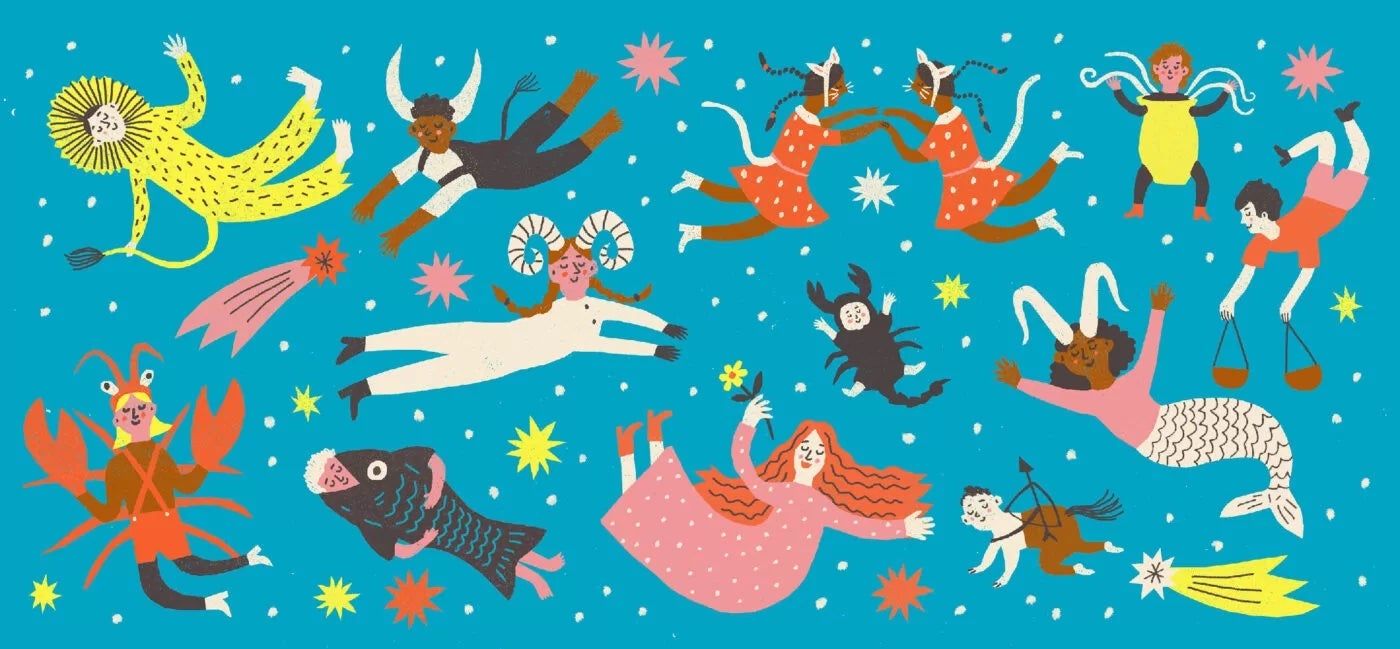
Astrology
Should You Read Your Child's Birth Chart?
Well, it depends.
- Illustration
- Louise Lockhart
Let’s say you order a bookcase from IKEA. Do you study the instructions with the intensity of a blazing sun? Do you chuck the instructions into the recycling bin, preferring a more DIY approach? Or are you somewhere in between, perhaps skimming and occasionally referring to the instructions but largely going by instinct and observation?
How you answer can help determine whether you should read your child’s birth chart. It might also say something about whether the books in your house are stacked neatly on shelves or sliding onto the floor.
Also known as a “natal chart,” a birth chart uses the placement of celestial bodies like the moon and the planets at the time of someone’s entrance into the world to provide a snapshot of their personality. It’s analogous to a set of instructions, but for understanding a person rather than putting together a piece of furniture.
To generate a birth chart, you need information about the individual’s birth, including date, time, and location. (If you don’t know the exact time, astrologers recommend using 12 pm. Your kid will be disappointed in you, though.) That information provides a picture of the sky at a precise moment, which can then be interpreted.
Every birth chart is divided into 12 sections called “houses,” which relate to an area of life like relationships and routines. The position of the planets in the houses can help explain a person’s strengths, weaknesses, tendencies, proclivities, and quirks.
Birth charts are more specific than sun signs. For example, if you’ve got a Cancer who acts like an Aries—i.e., a kid that’s bold, energetic, and outgoing, rather than nurturing and sensitive—a birth chart can help explain why.
A professional astrologer can make a birth chart for you, or you can try an app or website. Be prepared: with its symbols, lines, and numbers, a birth chart might trigger some serious math anxiety. My birth chart looks like someone took a box of uncooked spaghetti and tipped it out. I was back in ninth-grade geometry all over again. My child’s chart resembles an Escher doodle of overlapping isosceles triangles.
Do I see my kid amidst all those pointy shapes? The short answer is: sort of. Finding out that he has Gemini as his rising sign might explain his innate curiosity and tendency to rush-rush-rush from one task to the next. Then again, he may just be a typically nosy New Yorker who moves fast, talks faster, and likes to know what’s going on all the time.
Our kids are ciphers. When we look at them, it’s never just them we see. Instead, we see a constellation of images—the past, the present, the time they pooped all over the only onesie we brought to Grandma’s house. We see ourselves––both who we wish we were and who we’ve been. We superimpose what we want and hope our kids to be. A birth chart can help pin them down, putting them into focus when these competing images threaten to overwhelm.
Before you get your kid’s chart, consider getting your own done. Like the cliché about oxygen on airplanes, figuring yourself out first can help you better parent your little one. Ultimately, reading a child’s birth chart is another means of helping you better understand them and giving your child tools to better understand themselves.
A birth chart shouldn’t let either of you off the hook, of course. Your kid doesn’t get to forego cleaning their room because Mercury is in retrograde, and you don’t get to stop actively parenting because it’s Libra season. It’s still your job to foster resilience and free will and to do what you can to encourage your kid to become a well-adjusted adult.
When it comes to understanding who our kids are at a particular moment, nothing beats hanging out with them, whether discussing the national debt, playing video games, or organizing the loveys. Don’t talk about college, don’t nag about practicing taekwondo, and don’t ask too many questions. Instead, look around their room, listen to their chatter, and simply observe.
Go ahead and consult a horoscope to find the optimal time for such a meeting, then spend some time with your kid—whatever age they are, whatever their personality, whoever they are right this second. Our children are of us and of the stars, sure, but above all, children are 100% themselves.
Jessica Allen writes about food, culture, travel, parenting, and New York City, where she lives. She’s the author of several books, including The Great American Read: The Book of Books, The Magic of Astrology, and The Little Book of Axolotl Wisdom, coming in December. Read more of her work at jessallenica.com.